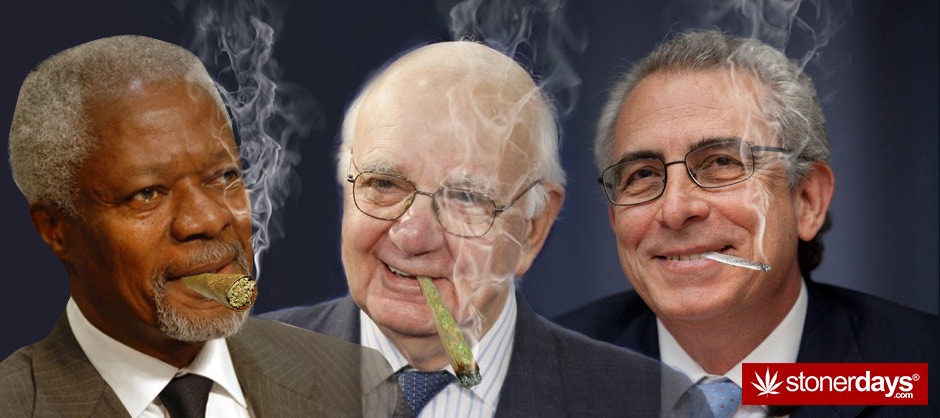World Leaders Aim For Global Drug Policy Shift
In a report to be released Tuesday, the Global Commission on Drug Policy, a panel of prominent political figures and activists, will call upon governments around the world to decriminalize drug use and legalize marijuana.
Members of the commission, including former Secretary General of the United Nations Kofi Annan, former Mexican President Ernesto Zedillo, former U.S. Federal Reserve Chair Paul Volcker and Virgin Group founder Richard Branson, are calling for drug policies shaped by a greater emphasis on public health, as well as alternatives to incarceration for nonviolent drug crimes. The participating members also say it is time to permit the legal regulation in all countries of psychoactive substances like cannabis and coca leaf.
“The import of the Commission’s report lies in both the distinction of its members and the boldness of their recommendations,” said Ethan Nadelmann, executive director of the Drug Policy Alliance, a partner organization of the commission, in an email to The Huffington Post. “The former presidents and other Commission members pull no punches in insisting that national and global drug control policies reject the failed prohibitionist policies of the 20th century in favor of new policies grounded in science, compassion, health and human rights.”
The report’s executive summary reads, in part:
The Commissioners call for an end to the criminalization and incarceration of users together with targeted prevention, harm reduction and treatment strategies for dependent users.
In order to reduce drug related harms and undermine the power and profits of organized crime, the Commission recommends that governments regulate drug markets and adapt their enforcement strategies to target the most violent and disruptive criminal groups rather than punish low level players. The Global Commission’s proposals are complementary and comprehensive. They call on governments to rethink the problem, do what can and should be done immediately, and not to shy away from the transformative potential of responsible regulation.
Members of the commission will meet Tuesday in New York City to discuss the report at a press conference moderated by Ryan Grim, The Huffington Post’s Washington bureau chief. The conference can be live streamed Tuesday morning at 9:45 a.m. EST.
Following the Tuesday conference, members of the commission will meet with United Nations Secretary General Ban Ki-Moon and U.N. Deputy Secretary General Jan Eliasson to discuss the report’s recommendations. The report is being released in anticipation of the upcoming U.N. General Assembly Special Session (UNGASS) on Drugs, scheduled for 2016. Members of the commission say they hope the U.N. will take their report’s recommendations into consideration in reshaping global drug policy.
“The facts speak for themselves. It is time to change course,” said Annan in a press statement about the report. “We need drug policies informed by evidence of what actually works, rather than policies that criminalize drug use while failing to provide access to effective prevention or treatment. This has led not only to overcrowded jails but also to severe health and social problems.”
The report’s executive summary summarizes the group’s multifaceted recommendations for policy reform:
- Putting health and community safety first requires a fundamental reorientation of policy priorities and resources, from failed punitive enforcement to proven health and social interventions.
- Ensure equitable access to essential medicines, in particular opiate-based medications for pain.
- Stop criminalizing people for drug use and possession — and stop imposing “compulsory treatment” on people whose only offense is drug use or possession.
- Rely on alternatives to incarceration for non-violent, low-level participants in illicit drug markets such as farmers, couriers and others involved in the production, transport and sale of illicit drugs.
- Focus on reducing the power of criminal organizations as well as the violence and insecurity that result from their competition with both one another and the state.
- Allow and encourage diverse experiments in legally regulating markets in currently illicit drugs, beginning with but not limited to cannabis, coca leaf and certain novel psychoactive substances.
- Take advantage of the opportunity presented by the upcoming UNGASS in 2016 to reform the global drug policy regime.
“Ultimately, the global drug control regime must be reformed to permit legal regulation,” said former Brazilian President Fernando Henrique Cardoso in a statement on the report. “Let’s start by treating drug addiction as a health issue — rather than as a crime — and by reducing drug demand through proven educational initiatives. But let’s also allow and encourage countries to carefully test models of responsible legal regulation as a means to undermine the power of organized crime, which thrives on illicit drug trafficking.”
The report comes as traditional punitive-oriented drug policies around the world are already being reconsidered and, within some governments, drastically reshaped. In 2013, Uruguay became the first country in the world to approve the legal regulation of the production, distribution and sale of marijuana. While the U.S. federal government continues to ban marijuana, two states — Colorado and Washington — have enacted programs that legalize the recreational use of the drug. Twenty-three other states and the District of Columbia have legalized marijuana for medical use in the U.S., and dozens more states are expected to consider legalization in some form in the coming years.
“We can’t go on pretending the war on drugs is working,” Branson said in a statement about the commission’s report. “We need our leaders to look at alternative, fact-based approaches. Much can be learned from successes and failures in regulating alcohol, tobacco or pharmaceutical drugs. The risks associated with drug use increase, sometimes dramatically, when they are produced, sold and consumed in an unregulated criminal environment. The most effective way to advance the goals of public health and safety is to get drugs under control through responsible legal regulation.”
Among the other members of the commission involved in the report are former Colombian President César Gaviria, former Swiss President Ruth Dreifuss and other political and business leaders from around the world.
“There’s no question now that the genie of reform has escaped the prohibitionist bottle,” Nadelmann, who is not an author of the report but is listed as a member of the commission’s “expert review panel,” told HuffPost. “I’m grateful to the Commission for the pivotal role it has played in taking drug policy reform from the fringes of international politics to the mainstream.”





Comments are closed.